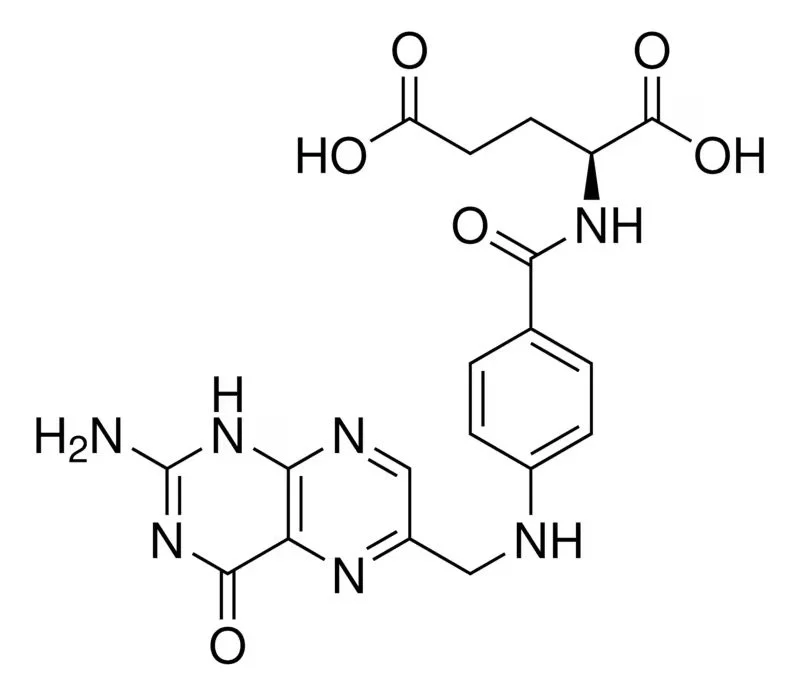Folic Acid vs. Folate
Many people think folic acid and folate are the same thing. After all, both are forms of Vitamin B9, and both help our bodies in important ways. But did you know that folate and folic acid are actually quite different? Knowing these differences can make a big impact on your health.
Folic acid is the synthetic form of Vitamin B9. You’ll find it in supplements and fortified foods like breakfast cereals and bread. Folate, on the other hand, is the natural form of Vitamin B9. It’s found in foods like leafy greens, broccoli, and lentils. So, while folic acid is man-made, folate comes from Mother Nature.
Why does this matter? Well, some people can’t process synthetic folic acid as easily as they can absorb natural folate. And for those who have trouble absorbing folic acid, it can lead to issues like folate deficiency. This deficiency can cause fatigue, weakness, and even anemia.
It’s important to understand the benefits of both folate and folic acid—whether you’re looking for better energy, healthier pregnancies, or just overall wellness. Knowing the right form to choose can help you feel your best. Let’s break it down and discover what makes folate and folic acid different.
Photo by Mikey Frost
Bioavailability and Absorption
One of the key differences between folate and folic acid is how well your body absorbs them. This is called bioavailability—basically, how much of the vitamin your body can actually use.
Folic acid absorption: Folic acid is absorbed in your intestines, but it needs to be converted into an active form before your body can use it. This process happens in the liver, but it can be slow, and for some people, it’s not very efficient.
Folate absorption: Folate, on the other hand, is absorbed more quickly because it’s already in the active form when it comes from foods like spinach, asparagus, and avocados. This means your body can use it almost right away.
Why Bioavailability Matters
Not everyone processes folic acid the same way. People with a certain genetic mutation called the MTHFR gene may have trouble converting folic acid into its active form, leading to issues like high homocysteine levels. High homocysteine can increase the risk of heart disease.
Studies have shown that the prevalence of MTHFR gene mutations varies across populations, with estimates ranging from 10% to 40% depending on the specific variant and ethnic group. The most common MTHFR polymorphisms are C677T and A1298C. For individuals with MTHFR mutations, consuming natural folate from foods or using methylated folate supplements may indeed be more beneficial than relying on synthetic folic acid. This is because those with MTHFR polymorphisms may have reduced ability to convert folic acid into its active form, 5-methyltetrahydrofolate (5-MTHF).
Active Folate vs. Folic Acid
Active folate is the type your body uses right away without needing any extra steps. This is important because it’s readily available in your bloodstream.
Folic acid metabolism can be slower and sometimes inefficient. If folic acid isn’t converted properly, it may stay in the bloodstream for too long, which can lead to negative effects over time.
Natural Folate vs. Synthetic Folic Acid
If you’re wondering whether to focus on natural folate from foods or synthetic folic acid from supplements, it really depends on your body and your needs. Here are a few things to consider:
Natural folate sources: Spinach, kale, broccoli, and beans. These are high in bioavailable folate, which means your body can use them quickly.
Folic acid fortified foods: Many grains, cereals, and bread products are fortified with synthetic folic acid, which can help those who might not get enough folate from food alone.
Overall, understanding how folic acid and folate are absorbed can help you make the best choices for your health. If you have trouble processing folic acid or have a known MTHFR gene mutation, choosing natural folate or supplements with methylated folate could make a big difference. It’s all about finding the form that works best for you!
Take our FREE Gut Health Assessment to see if your body is absorbing nutrients efficiently
Photo by iStrfry , Marcus
Health Impacts and Safety
Both folic acid and folate play major roles in keeping our bodies healthy, but there are some important differences when it comes to safety and specific health benefits.
Pregnancy and Birth Defects
One of the most well-known benefits of both folate and folic acid is their ability to prevent neural tube defects in babies. Pregnant women are often advised to take folic acid or folate to reduce the risk of birth defects like spina bifida. Here’s why it matters:
Folic acid during pregnancy: Folic acid supplements are often recommended because it’s easy to find in fortified foods and supplements.
Folate and pregnancy: Eating folate-rich foods is also important, as they provide the natural form of this essential nutrient.
Pregnant women aren’t the only ones who benefit from folate and folic acid. These nutrients are also key for anyone looking to boost overall wellness.
Brain and Heart Health
Did you know that folate is good for your brain? Studies have shown that people who get enough folate are less likely to experience cognitive decline as they age. This is why folate for brain health is so important. A large study conducted in Ireland followed 3,140 older adults over 8 years and found that lower folate concentrations were associated with accelerated cognitive decline1. Specifically, folate levels below 11.2 nmol/L predicted a decline in global cognitive function, while levels below 21.8 nmol/L predicted poorer episodic memory performance.
This research suggests that maintaining adequate folate levels may help protect against cognitive decline in older adults. The study authors noted that low folate status is a modifiable risk factor for cognitive decline, highlighting the potential importance of ensuring sufficient folate intake as people age.
Folate helps with:
Improving memory and mental clarity
Supporting overall brain function
In addition to brain health, folate and folic acid are also great for your heart. Both forms help lower levels of homocysteine, a type of amino acid that can increase the risk of heart disease. Here’s how:
Folate for heart health: Folate from natural sources is highly effective in helping reduce homocysteine levels.
Folic acid for heart health: Taking folic acid supplements can also help, especially if you have trouble getting enough folate from your diet.
Safety Considerations
Folic acid is generally considered safe for most people when taken at recommended doses. The U.S. Centers for Disease Control and Prevention (CDC) states that taking 400 mcg of folic acid per day has not been shown to cause harm. However, there are some concerns about high doses of folic acid:
Unmetabolized folic acid: When folic acid is consumed in amounts higher than the body can process at once, some may remain in the bloodstream as unmetabolized folic acid. While no confirmed health risks have been found from this, it has been a subject of concern.
Potential risks of high doses: The National Institutes of Health (NIH) Office of Dietary Supplements notes that high doses of folic acid might increase the risk of colorectal cancer and possibly other cancers in some people. They advise caution about taking high doses of folic acid supplements, especially for those with a history of colorectal adenomas.
Upper limit: The NIH has established an upper limit for folic acid intake from supplements and fortified foods. For adults, this limit is 1,000 mcg per day.
Masking vitamin B12 deficiency: High doses of folic acid supplements might hide a vitamin B12 deficiency, potentially leading to permanent damage to the brain, spinal cord, and nerves.
High doses of synthetic folic acid, especially when not absorbed properly, might stay in the bloodstream too long, leading to possible side effects. These could include:
Masking symptoms of a folate deficiency
Possible negative effects on brain health over time
If you’re taking high doses of folic acid or have concerns about how your body processes it, it may be safer to focus on natural folate-rich foods or methylated folate supplements.
Take our FREE Amino Acids Assessment to see if you have any deficiencies
Photo by Blubel
Specific Applications and Supplementation
Folate and folic acid are vital not just for preventing deficiencies, but also for a variety of specific health conditions. From treating anemia to boosting fertility, here’s how these nutrients work in real-life applications.
Folate and Anemia
If you’ve ever felt weak, tired, or easily fatigued, you might be dealing with folate deficiency anemia. Folate is key for producing healthy red blood cells, which carry oxygen throughout your body.
Folate for anemia: Eating foods rich in folate like leafy greens, beans, and citrus fruits can help prevent or treat anemia.
Folic acid for anemia: Folic acid supplements can be used if your diet isn’t providing enough folate. In many cases, doctors recommend folic acid for people with anemia to help raise their red blood cell counts.
Fertility and DNA Synthesis
Folate is also essential for fertility in both men and women. It plays a crucial role in DNA synthesis and cell growth, which is important when trying to conceive. Here’s how it helps:
Folate for fertility: Natural folate helps ensure healthy cell division and DNA production, which are key for reproduction.
Folic acid for fertility: Folic acid supplements are often recommended to support healthy egg and sperm production, especially for those with fertility challenges.
In addition to fertility, both folate and folic acid are important for DNA synthesis and cell growth. Whether you’re growing new tissue, healing from an injury, or simply supporting the renewal of your body’s cells, folate is essential.
Fortified Foods vs. Natural Sources
So, should you focus on folic acid fortified foods or stick to natural folate sources? It really depends on your needs and lifestyle. Here’s a quick comparison:
Folic acid fortified foods: These include cereals, bread, and pasta, which have synthetic folic acid added to them. They’re helpful for people who may not get enough folate through food alone.
Natural folate sources: These include spinach, kale, liver, lentils, and oranges, which are naturally high in bioavailable folate.
For most people, a balance of both can ensure you get enough Vitamin B9 to support your health.
Interested in working with a Gut Specialist?
Book with one of our team members to see how we can come alongside you.
Conclusion
Whether you’re looking to improve your mental health, heart health, or overall wellness, understanding the differences between folic acid and folate can help you make better decisions. Here’s a recap:
Folate for mental health: Natural folate can help reduce symptoms of depression and support mood regulation.
Folic acid for mental health: Folic acid supplements can also help, but may not work as well for those with the MTHFR gene mutation.
Folate and homocysteine: Both folate and folic acid play a role in lowering homocysteine levels, reducing the risk of heart disease and improving brain function.
Folate methylation: Folate is key in the methylation process, which supports detoxification, brain function, and DNA repair. If your body struggles to process folic acid, switching to methylated folate can make a big difference.
Folic acid methylation: If you have trouble processing folic acid, the unconverted form may build up in your system, which is why it’s important to monitor how much folic acid you’re taking.
Ultimately, both folate and folic acid have their place in a healthy lifestyle, but the form you choose matters. Whether you prefer to get your nutrients from food or supplements, knowing how your body processes each form will help you feel your best.




